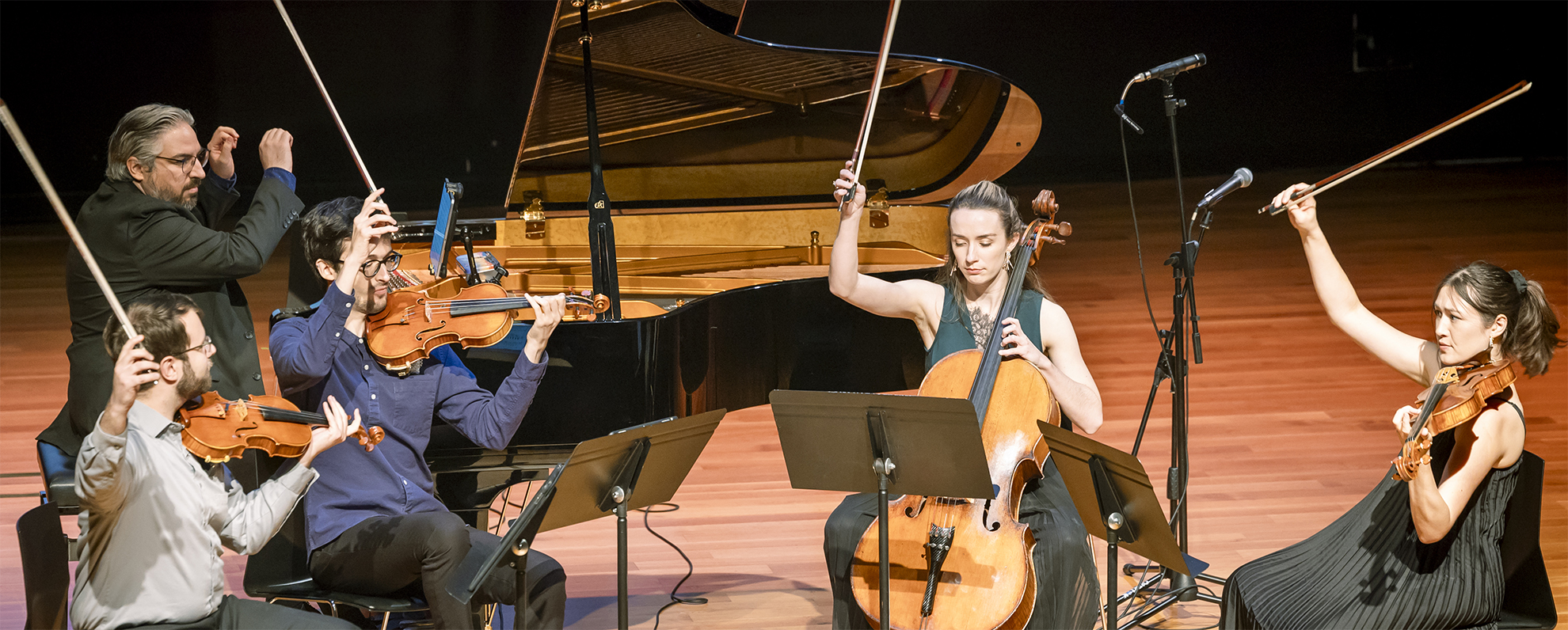Houston’s conductorless string ensemble Kinetic is celebrating its tenth anniversary this season. Founder and Artistic Director Natalie Lin Douglas still remembers the moment violinist Giancarlo Latta walked into her practice room at Rice University’s Shepherd School with the seed of an idea. They had just participated in an unconducted performance at the music school and were inspired by it.
Ten years later, Kinetic has matured into a one-of-a-kind professional ensemble, while its 16-member roster of musicians continue to develop diverse and versatile musical careers across the country.
“I’m incredibly proud of how we’ve all ‘grown up,’ says Lin Douglas, who is now based in Boston and an associate professor at MIT. “In addition to being a part of Kinetic, some of us are also members of symphony orchestras and string quartets, some are university professors and arts administrators, some practice other art forms, and some are really invested in social issues.”
That cohesive artistic vision was on full display in a pair of concerts this September and October. The first was Sounds of Anatolia, presented by Asia Society Texas as part of Hoppa Project’s Fifth Turkish Music Festival. Kinetic teamed up with award winning Turkish-American composer Erberk Eryılmaz to present a scintillating program exploring the vibrant and diverse sound colors of Anatolian music.
Eryılmaz is a graduate of the Shepherd School and many Kinetic musicians have had experience playing his music before. Double bassist Austin Lewellen, who is also the group’s managing director, says that Eryılmaz’s music “keeps the folk traditions close to the surface and is endlessly compatible with the rich traditions of fiddle and fast string playing.”
The musicians brought out the character and spirit of the music with panache, executing complex rhythmic variations with precision and verve, and giving acute attention to sonic modifications as well as subtle shifts in color, tone, and texture. Frenetic energy drove Eryılmaz’s Insistent Music for Piano Quintet, while the synergy of Turkish and Western contemporary aesthetics in Sınırsız allowed virtuoso clarinetist İsmail Lumanovski to deliver a sonorous and exuberant performance with strings and piano.
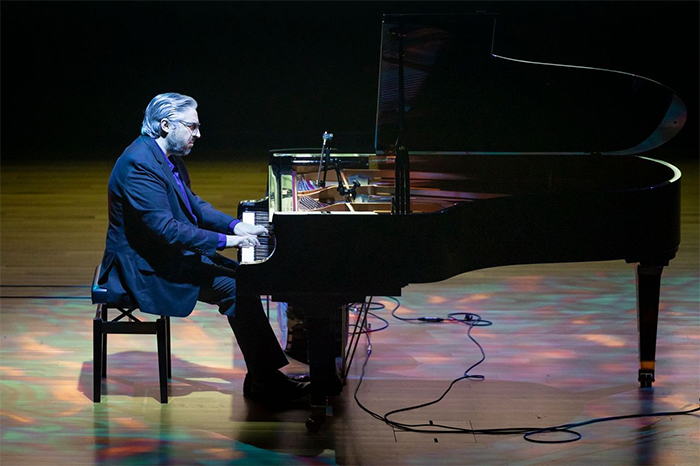
1 ⁄4
Composer Erberk Eryılmaz performing with Kinetic in Sounds of Anatolia, presented by Asia Society Texas as part of Hoppa Project’s Fifth Turkish Music Festival. Photo by Chris Dunn/Asia Society Texas.
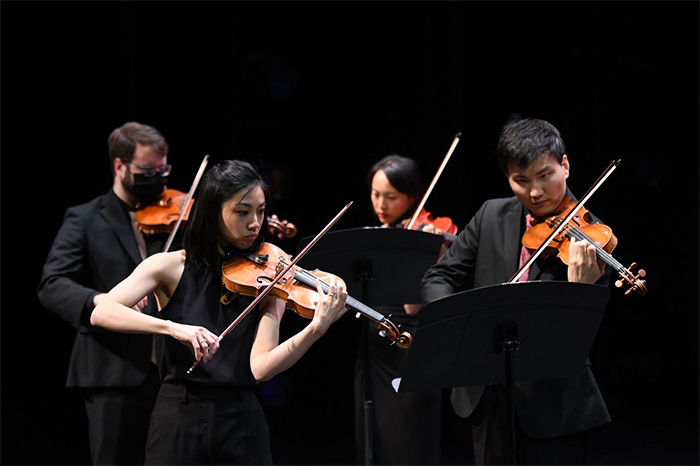
2⁄4
Jacob Schafer, Natalie Lin Douglas, Chandler Yu, and Samuel Park. Photo by Jeff Grass.
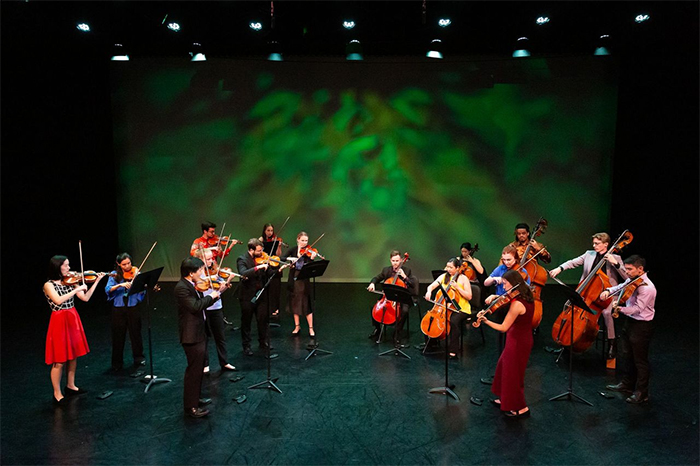
3 ⁄4
Kinetic in "At Play" May 2024 at the MATCH. Photo by Lynn Lane.
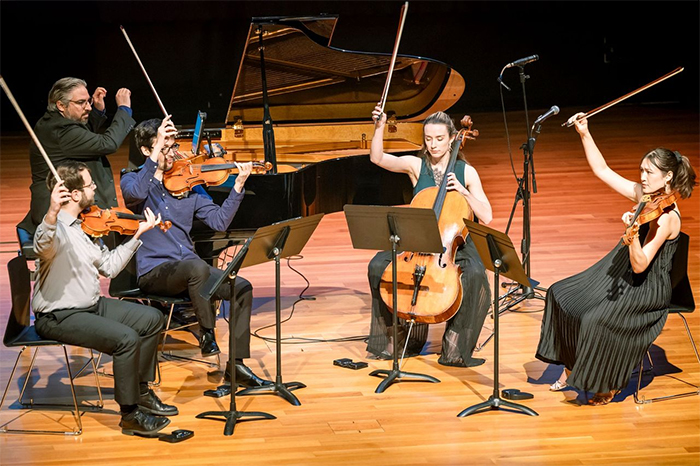
4 ⁄4
Kinetic performing in Sounds of Anatolia, presented by Asia Society Texas as part of Hoppa Project’s Fifth Turkish Music Festival. Photo by Chris Dunn/Asia Society Texas.
This season Kinetic will inaugurate a newly formalized chamber music series in intimate venues around the city. “We are interested in broadening our geography within Houston,” says Lewellen. When Kinetic launched their debut album with an event at Eden Plant Co. in the Second Ward, the response from the audience was overwhelmingly positive. “There were a lot of people who were just over the moon that there was chamber music in their neighborhood. So we are working on expanding out and finding new places.”
The first of these chamber music concerts will be on Nov. 22 at SANMAN (See A Need Meet A Need), an art and community space just north of Downtown. The Stranger’s Case features a preview performance of Houston composer Karim Al-Zand’s eponymous new work for voice and strings. “The piece is about the concept of placemaking and building a new home,” says Lewellen. “We just took the theme and ran with it.”
Paul Wiancko’s American Haiku is about what it means to be American; the deeply human lyrics of Errollyn Wallen’s songs express a feeling of belonging; and Andy Akiho’s Portal is about his experiences finding a sense of home in the New Mexico desert. “Portal is interesting,” adds Lewellen. “It’s not for a fixed instrumentation.”
Lewellen first heard the piece performed by Sandbox Percussion, and he knew instinctively that it would be a perfect fit for Kinetic. “It felt very string-like in the way they shaped the voicings and brought in textures. It’s simply a set of different voices and very much has to be constructed.” This freedom to experiment is a challenge Kinetic enjoys. Long-time Kinetic collaborator and creative tour-de-force Alexandra Smither will be the guest soprano on the program.
Lin Douglas points out that one of the things that marks this Kinetic season is the focus on education at the University level. Kinetic has residencies at Sam Houston State University, MIT, and Rice University. Environmental Strings (Mar. 29, 2025) is the culmination of a partnership with Rice University. Shepherd School student composers will be working with Rice students who are visual artists, poets, and other creatives to develop cross-disciplinary works with an environmental theme. Kinetic will be workshopping, recording, and ultimately performing these works at the Moody Center for the Arts.
The season finale Deep Rooted (May 23, 2025 at the MATCH) is a celebration of the ensemble’s ten years of music-making in Houston. “Part of our identity has always been our deep-rooted connection to Houston,” says Lin Douglas. Kinetic is marking the anniversary with a new commission by Houston-born composer Mason Bynes. Bynes is from Sugar Land and now has a thriving career in New York. Lewellen relates a delightful story of how Bynes first conceived the idea of being a composer when she was in middle school.
“She was a choir kid and knew how to write out some music. She and her friends started arranging little musical telegrams to sell to their friends to sing to other classmates.” That fun side hustle opened the window to a career in music composition. Lin Douglas adds that growing up Bynes spent a lot of time at the roller rinks in her neighborhood, “I think the fond memory of those roller rinks will make its way into the piece.”
“In many ways his string writing shaped Kinetic’s style,” explains Lin Douglas. “We lean into music that is virtuosic across all the string instruments, really rhythmic, and full of a variety of textures.”
Performing the piece again ten years later is a “full circle” moment. The piece itself is an homage to Britten’s composition teacher Frank Bridge. Britten borrows a tune from a Bridge piece for string quartet (also on the program) and transforms it into a wildly modern and brilliant work. “There’s something fitting here about us as an ensemble looking back on our early beginnings, when we were all students, and Britten looking back, but also looking forward too.”
“Looking back there was something really scrappy and green about the way we were simply motivated by the desire to make really exciting and meaningful music together,” reflects Lin Douglas. “We all volunteered so much of our time for the love of what we were creating.” Along the way, the ensemble that began with a kickstarter campaign and few resources has grown into a successful nonprofit performing arts organization.
“I learned to lead and manage a nonprofit, to fundraise and advertise, to be an administrator, all that stuff,” says Lin Douglas. “But the motivation has always been in the music-making itself.”
—SHERRY CHENG

